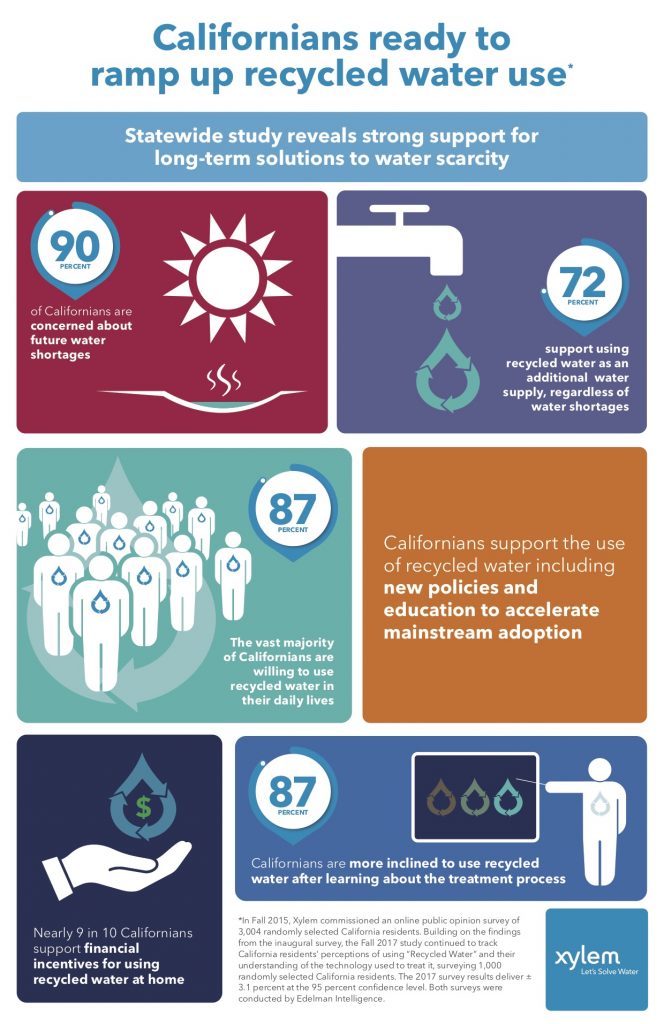Wastewater – a precious resource with the potential to liberate water scarce communities
Solving the planet’s water challenges has never been more urgent. The global population is growing exponentially, while rapid agricultural and industrial development continues apace. Migration to cities is increasing demand for reliable urban water infrastructure and climate change poses threats to already stressed water resources. Communities across the globe, already struggling with stretched water supplies, must now do more with less. Across Southwestern US states, home to some of the nation’s most fertile farming areas, drought has descended, compounded by wildfires and threatening the livelihoods of farmers. Meanwhile, limited rainfall in California continues to put local water supplies under severe pressure. In the face of extreme drought episodes like these, the benefits of water reuse are increasingly obvious as policy makers seek a path to a secure water future.
It was within this context that Xylem commissioned an independent poll of 3,000 California residents in late 2017, to better understand perceptions about recycled water and their knowledge of the technology used to produce it. One of the worst droughts in a generation had hit the state in recent years, wells dried up and devastating consequences were unleashed on plant and wildlife and communities dependent upon agriculture. A drought emergency was declared in 2014 and shortly afterwards officials ordered mandatory conservation for the first time in state history. While the drought emergency has now been declared over, recent reports indicate that the impact of climate change will make California’s drought cycle even more volatile.
Against this backdrop, the statewide survey confirmed enduring concern amongst an overwhelming majority of California residents that another drought is looming, with 90 percent concerned about future water supplies. It’s understandable then that the vast majority of California residents – 87 percentof survey respondents –are supportive of using recycled water in their daily lives, and why 72 percentsupport using recycled water as an additional water supply, regardless of water shortages.

Water reuse is not a new phenomenon to the people of California. Throughout the state there are a rapidly growing number of water districts that are developing long-term, sustainable strategies to meet the needs of their customers, now and in times of water supply stress. The Orange County Water District is one of those operators. In fact, they recently set a Guinness World Record title for purifying the most drinking water in 24 hours. Since 2008 the Groundwater Replenishment System, a collaboration between Orange County Water and Sanitation Districts, has provided vast amounts of recycled drinking water to north and central Orange County.
In Northern California, the Silicon Valley Advanced Water Purification Center provides eight million gallons per day of purified water to support some of the world’s most innovative companies. And San Diego is home to the Advanced Water Purification Facility at the North City Water Reclamation Center, which is optimizing water reuse technologies to replace imported potable water resources.
We were commissioned to deliver a unique water reuse system to increase the supply of purified, recycled water to Los Angeles. The system, now completed and operational, is part of the city’s Terminal Island Water Reclamation Plant’s groundbreaking expansion of its Advanced Water Purification Facility that treats non-potable recycled water. The process includes microfiltration and reverse osmosis, followed by Xylem’s Advanced Oxidation Process to produce non-potable reuse water which is compliant with California’s stringent groundwater recharge regulations.
Water practitioners across Asia too are increasingly extracting value from wastewater. In India, Mumbai’s metro rail design includes a compact water reuse system capable of recycling the metro’s almost 1.2 million liters of daily wastewater. To turn this vision into reality, Mumbai’s metro rail team are deploying advanced wastewater treatment solutions to treat water by aerating, settling, and decanting the water in a single system with energy-efficient, and cost-effective technologies, followed by integrated disk filtration and disinfection. The same technology, alongside ultra-filtration membranes and a UV disinfection system, are turning wastewater into potable drinking water at our own reuse plant in Gujarat, India.
As community leaders around the world continue to manage growing water demand and increasingly variable supply, we need to develop more community education to enable measures that are needed to proliferate widespread water reuse adoption. The California State Water Board is currently seeking public comment on this very issue. Our research finds that the majority of Californians– across a wide political spectrum – support public policies to promote and incentivize the use of recycled water. Almost 90 percent of respondents said they would support using recycled water if it reduced their monthly water bill, and the same percentage support statewide actions by water agencies to adopt recycled water as a standard practice to prepare for future droughts. A flexible policy framework that recognizes the unique water needs of local communities will be critical to securing public acceptance.
The importance of public education was a further factor borne out by our research, with 75 percent of Californians reporting that they are more likely to use recycled water for personal household purposes after learning about the technologies used to purify the water. All in, it is clear that with consistent policies and education, there is an exciting opportunity to accelerate adoption across California, and possibly beyond.
by Ron Askin, Xylem Vice President of Water Utilities, North America
+++
About the survey:
In Fall 2015, Xylem commissioned an online public opinion survey of 3,004 randomly selected California residents. Building on the findings from the inaugural survey, the Fall 2017 study continued to track California residents’ perceptions of using “Recycled Water” and their understanding of the technology used to treat it, surveying 1,000 randomly selected California residents. The 2017 survey results deliver ± 3.1 percent at the 95 percent confidence level. Both surveys were conducted by Edelman Intelligence.

